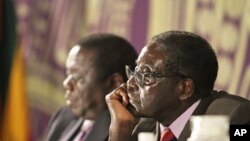The International Crisis Group says it is unlikely Zimbabwe will hold elections by the constitutionally mandated deadline of June 2013. In a new report, the ICG says President Robert Mugabe's ZANU-PF party is the main obstacle to timely and fair elections.
Zimbabwe analysts say the report correctly highlights the need for tougher mediation by the Southern African Development Community (SADC).
Piers Pigou, ICG's Southern Africa Project Director, says ZANU-PF is blocking wide-ranging political reforms spelled out in the 2008 Global Political Agreement (GPA), which established Zimbabwe's power-sharing government.
"A number of people inside ZANU-PF have said that they are not going to negotiate themselves out of power," he says. "If they construe any reform as weakening their hegemony, they are not going to support those kinds of processes, so there is little incentive to pursue a reform strategy which might weaken it."
The GPA outlines a series of reforms, including a new constitution, to be carried out by ZANU-PF, the former opposition MDC party and a smaller MDC faction. But Pigou says there has been no “significant” progress in implementing the agreement since March, when SADC's Zimbabwe mediator, South African President Jacob Zuma, made a speech in Livingstone, Zambia. In that speech, Zuma, without naming names, blamed ZANU-PF for blocking reforms to achieve free and fair elections.
Pigou says when negotiators referred their points of contention to the principals - President Mugabe, MDC leader Morgan Tsvangirai and small MDC president Welshman Ncube - the principals found solutions, which were then ignored on the ground.
“We get a sense that SADC is sitting on its hands in the post-Livingstone consensus," says Pigou. "We don’t see them stepping up to the plate in terms of the violations that have continued in the post-Livingstone setting - the continued harassments, the arrests of cabinet ministers, the invasion of parliament, the violence over the last couple of months. We don't see an adequate, an expeditious response from SADC."
In June, SADC officials agreed to send a three-man technical team to Harare to help the multi-party Joint Implementation and Monitoring Committee resolve a large number of political issues and day-to-day problems.
The SADC team has yet to arrive.
"At the moment, I am not expecting much from SADC until it gets its people on the ground in order to be able to inform itself, because at the moment it is completely reliant on the Zimbabwean parties themselves, who are continuing to present positions that are diametrically opposed in terms of analysis and substance," says Pigou.
He says all attempts at reforming the security sector, which is controlled by ZANU-PF, have failed.
Veteran Zimbabwe analyst Brian Raftopoulos says President Mugabe, who is 87 and in uncertain health, is hindering progress toward free and fair elections.
"I think the central problem around the GPA is the problem within ZANU-PF, the succession issue, which has been a major problem not just for ZANU but for the people of Zimbabwe, and the fact that ZANU cannot conceive of itself as a party which can lose power," says Raftopoulos. "The idea that ZANU thinks it owns the state is a key problem."
Raftopoulos says the SADC should do more to resolve outstanding GPA issues such as security reform and consider suspending Zimbabwe from the SADC if it fails to fulfill GPA obligations.
"We are seeing in [the Arab world], for example, the strong stand taken by the Arab League around the Syrian question," he says. "It is important for regional organizations to understand that they can play a positive role, that they can take strong measures like suspension, and that option needs to be made known if Mugabe and ZANU-PF continue to carry on [the] recalcitrant stand they are making. But one hopes it doesn't get to that. [One hopes] there will be movement through negotiators and that lessons will [be] drawn from what is happening elsewhere on the continent."
Ibbo Mandaza is a former senior member of ZANU-PF and an academic who leads a political think tank in Harare. He says intellectuals are mapping out ideas to reform the GPA so the inclusive government could continue beyond 2013 in order to avoid ZANU-PF political violence.
"The violence has always been related to elections and we have been saying to [concerned] parties, 'Stop talking about elections,'" he says. "If you put the election issue on the back burner, there won’t be violence or there will be less violence. Institutional mechanisms related to GPA will make violence increasingly impossible."
Zimbabwe's last elections in 2008 were marred by numerous killings and beatings, most of them administered by ZANU-PF supporters against Mugabe's opponents.
ICG: Mugabe Party Blocking Reforms




